구글의 Danny Sullivan 트위터에 발표한 구글 검색 관련 글을 소개합니다. 이 글은 SEO 업계에서 상식적으로 받아들여졌던 저자 소개, 저자 페이지 URL이 구글의 정책이 아니었는데 외부 SEO 관계자들이 오해를 했다는 중요한 내용도 포함합니다.
중요한 시사점은 구글은 완벽하지 않고 가장 도움되는 콘텐츠를 보여주기 위해 노력한다는 것이었습니다 최근 업데이트에 대한 문서의 대부분이 본질적으로 수십 년 동안의 동일한 지침을 유지하고 있고 실제로 새롭거나 최근 업데이트에만 특정한 것이 아니라는 점을 설명하고 있습니다. 구글의 가이드를 SEO 관계자들이 잘못 해석한 경우도 있다는 언급도 있습니다. 구글의 발표 내용을 원문 그대로 정리해봅니다.
1. 구글의 (검색) 결과는 완벽하지 않습니다. 우리도 실수를 합니다. 항상 옳은 것은 아닙니다. 모든 것을 올바르게 할 수는 없습니다. 하지만 우리가 할 수 있는 것은 가능한 가장 유용한 콘텐츠를 보여주기 위해 계속 노력하는 것입니다. 더 자세한 정보는 여기에서 확인하세요:
Google’s results aren’t perfect. We do make mistakes. We don’t always get it right. We’ll never get everything right. But what we can do is keep working to show the most helpful content that we can. More here: https://blog.google/products/search/how-we-update-search-improve-results/
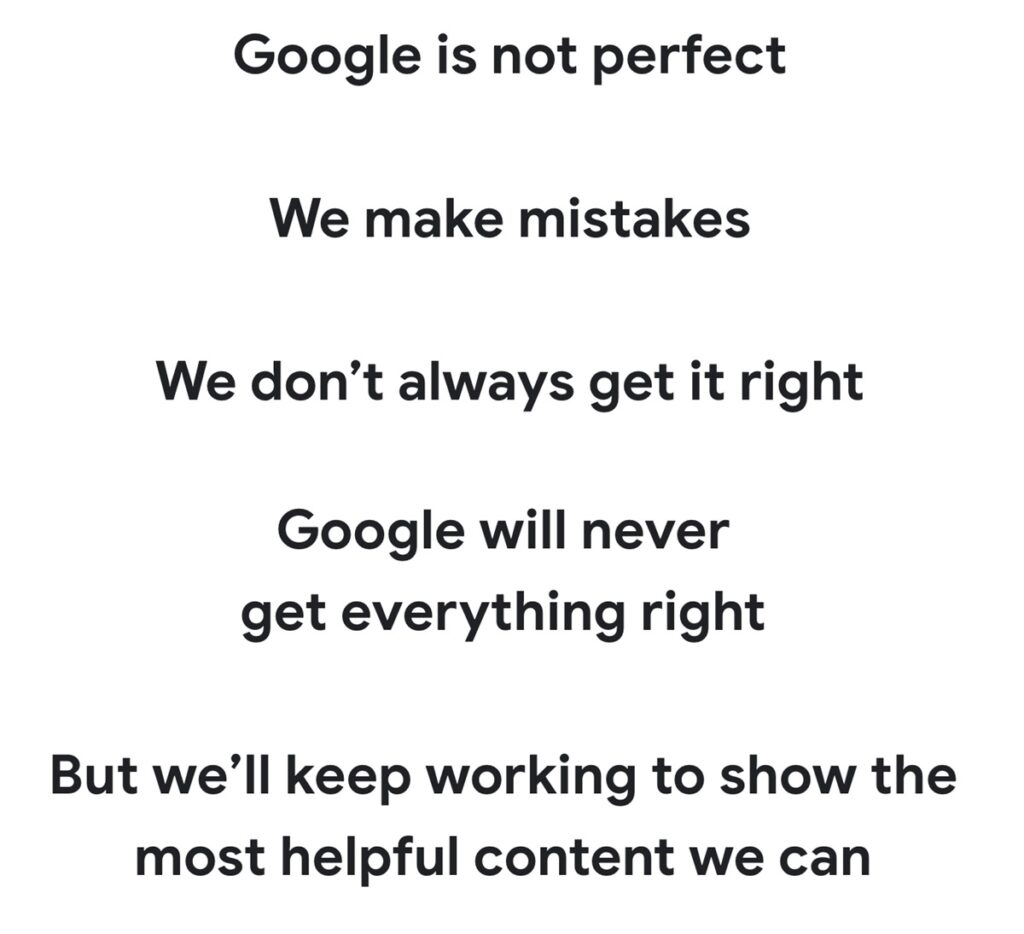
2. 우리의 유용한 콘텐츠 시스템은 구글 검색 개선의 예입니다. 유용한 콘텐츠 링크. 이 시스템은 작년에 사람들이 더 오리지널하고 유용한 콘텐츠를 보게 하기 위한 목표로 출시되었습니다. 9월에, 우리는 이 시스템을 개선했습니다. 이로 인해 일부 창작자들의 질문과 우려가 생겼습니다.
Our helpful content system is an example of improving Google Search: https://developers.google.com/search/docs/appearance/helpful-content-system
It launched last year with the goal to ensure people see more original, helpful content created for people. In Sept, we improved the system. That sparked some creator questions & concerns

지난 몇 주 동안 교류한 일부 사람들은 구글 검색과의 성공에 대한 우리의 지침이 새롭다고 생각합니다. 그들은 이제 뭔가 다른 것을 해야 한다고 생각합니다. 하지만 구글에서는 이것이 혼란스럽습니다. 왜냐하면 이것은 새로운 것이 아니기 때문입니다. 이것은 수년, 심지어 수십 년 전의 지침에 기반하고 있습니다…
Some I’ve interacted with over the past few weeks believe our guidance about success with Google Search is new, that they now have to do something different. But for us at Google, that’s confusing, because it’s not new. It’s is based on years-old and even decades-old guidance…
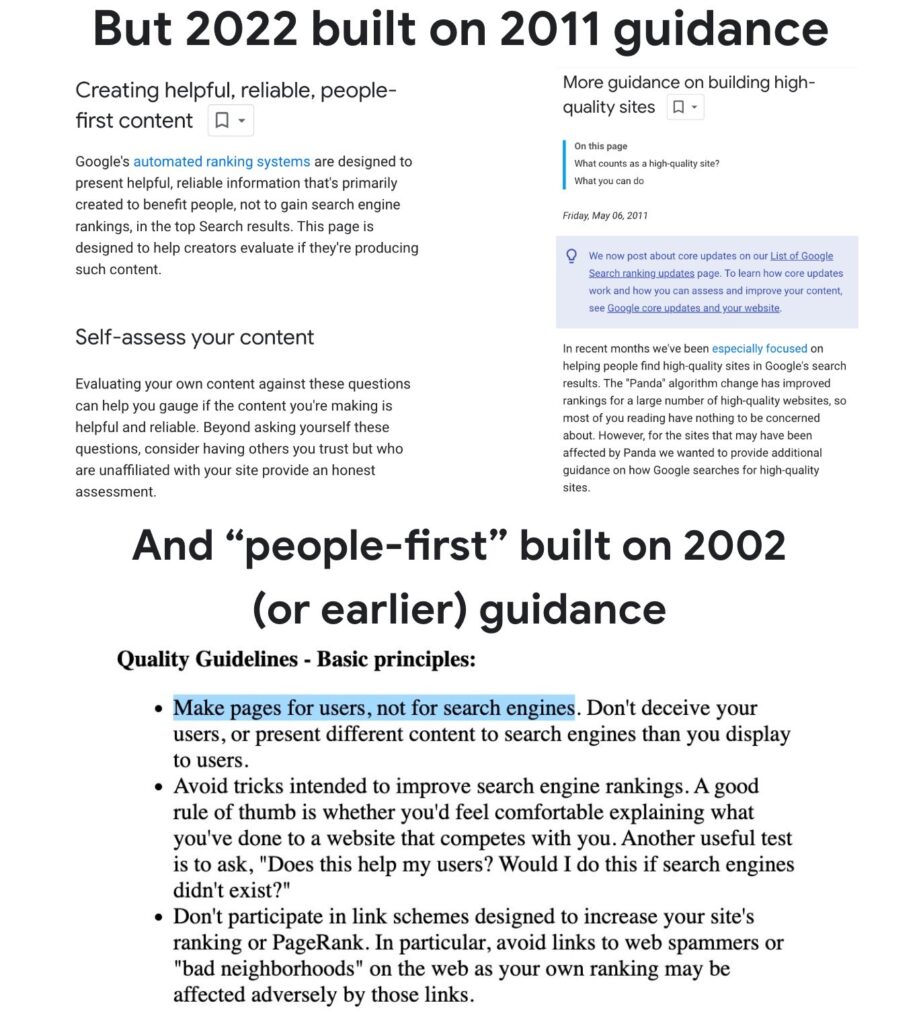
4. 이것은 저에게 많은 회고를 하게 만들었습니다. 지침이 새로운 것이 아닌데, 왜 이렇게 많은 사람들이 혼란스러워하는 걸까요? 간단히 말해서, 우리의 장기적인 조언인 “구글을 위해 일하지 마세요”는 구글과의 성공을 원하는 사람에게는 직관에 반하는 것처럼 보입니다.
That’s led me to do a lot of retrospection. If the guidance isn’t new, why do so many feel confused? Quite simply, it seems that our long-standing advice of “Don’t do things for Google” is counter-intuitive to anyone who is trying to be successful with Google.
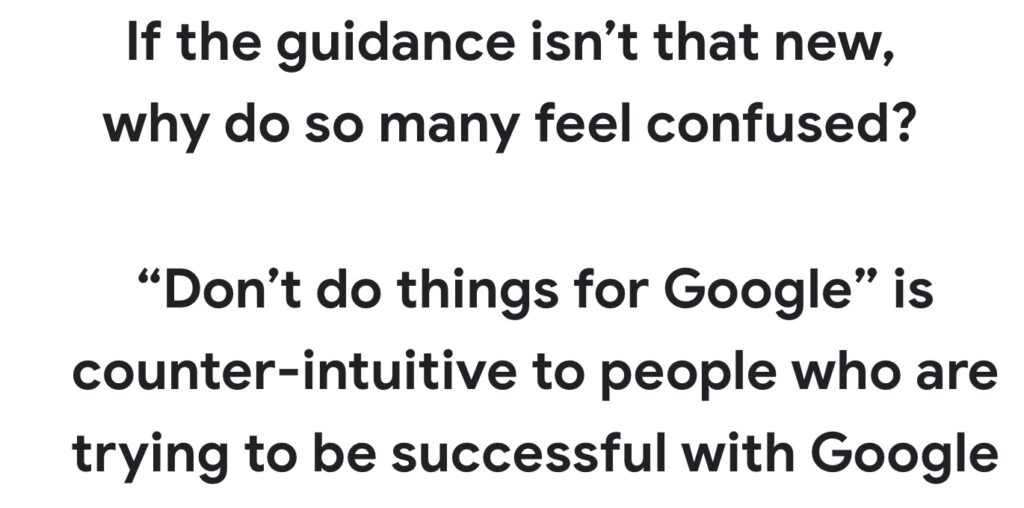
5. 우리의 지침은 일반적으로 광범위한 목표에 관한 것입니다. 예를 들어, 우리는 사람들이 콘텐츠를 신뢰하게 만드는 방식으로 콘텐츠를 생산하는지 생각해보라고 조언합니다(구글이 아니라, 당신이나 독자를 위한). 예를 들어, 저자에 대한 배경 정보와 같은 사람들이 콘텐츠를 신뢰할 수 있는 요소들을 예시로 듭니다…
Our guidance is generally about a broad goal. For example, we advise people to think if they product content in a way that *makes you want to trust it* (not Google, you – or a reader) with examples of what might cause people to trust content, such as background about an author…

6. 들리는 것은 구체적인 내용입니다. 사람들은 저희가 저자 페이지에 대해 이야기하는 것에 집중하고, 사람 중심의 콘텐츠에서 기대할 수 있는 것처럼 구글이 그 특정한 것을 원한다고 생각합니다. 마치 우리가 그것을 확인하고 있고, 그것을 가지고 있다는 이유로 콘텐츠를 더 잘 순위 매길 것처럼 말이죠(하지만 우리는 그렇게 하지 않습니다).
What’s heard are specifics. People focus on us talking about an author page as being something that people might expect from people-first content & believe Google itself wants that specific thing, as if we’re going to check for it and rank content better for having it (we don’t).
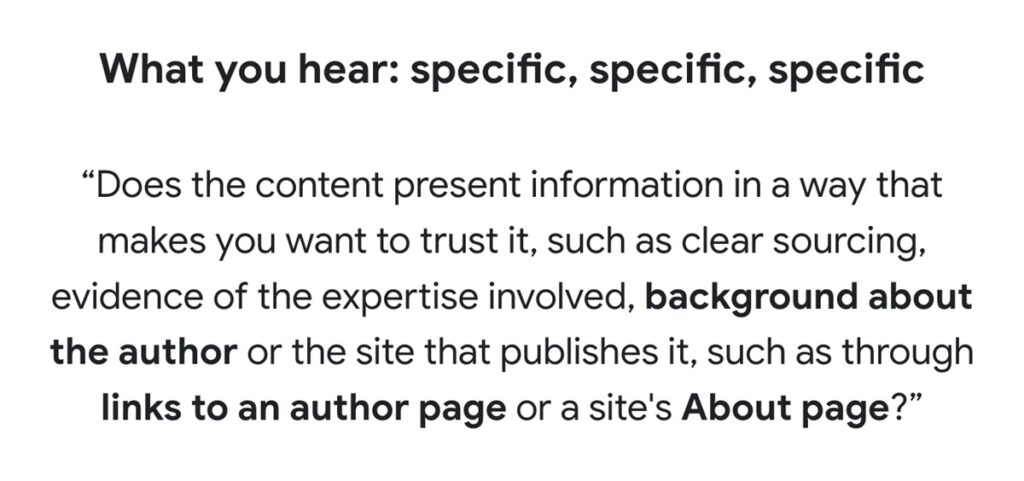
7. 더욱 복잡한 것은, 일부 사람들은 우리의 지침을 읽고 우리가 말하지 않은 확실한 권고를 내립니다. “당신이 ‘About’ 페이지를 가지고 있다면, 순위가 더 높아집니다!” 그렇지 않습니다. 그런 방식으로 작동하지 않습니다. 이는 구글에서 잘 순위를 매기는 방법에 대한 조언을 받을 때 고려해야 할 중요한 사고를 이끕니다.
Further complicating things, some read our guidance & make definitive recommendations we’re not saying. “If you have an About page, you rank better!” You don’t. Doesn’t work that way. Which leads to some critical thinking to consider when getting advice on ranking well in Google

8. “한 가지 이상한 오래된 요령”이 효과가 없다면, “한 가지 이상한 SEO 요령”을 조심하세요. 구글 랭킹도, 일반적인 인생에서도 그 어떤 것도 그렇게 단순하지 않습니다. 누군가가 “이것이 구글이 하라고 하는 것”이라고 말한다면, 그것이 우리가 말한 것인지 아니면 누군가의 해석인지 명확하게 하고 있는지 확인하세요.
If “One weird old tricks” don’t work, then beware “one weird SEO trick.” Nothing with Google ranking – or in life in general – is that simple. If someone is telling you “this is what Google says to do,” are they making clear if it’s what we have said or if their interpretation?
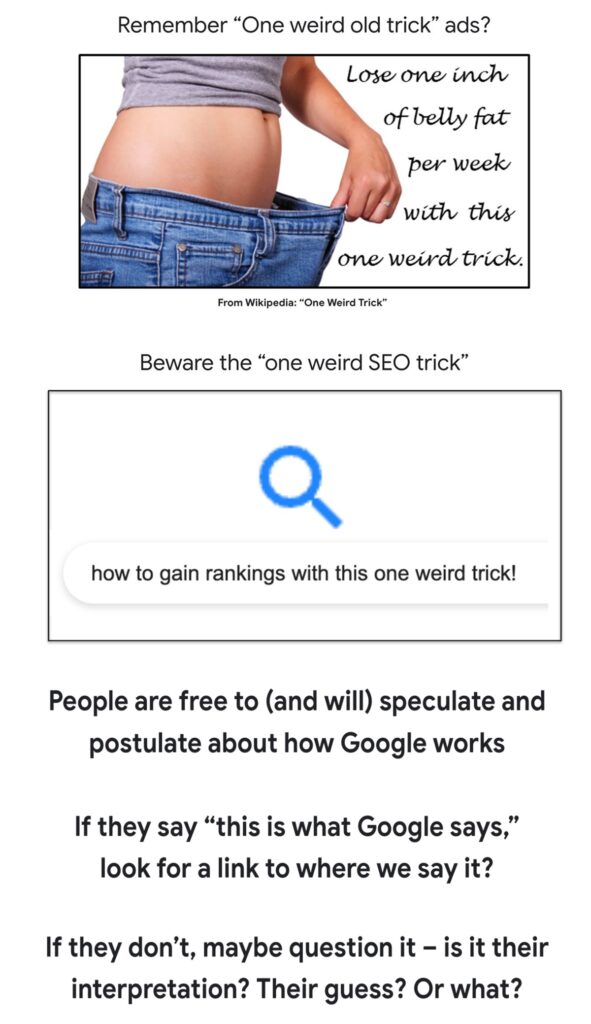
9. 구글 랭킹에 대한 훌륭한 제3자 조언이 있습니다. @iPullRank @lilyraynyc @Marie_Haynes @ajkohn @MediaWyse @glenngabe 는 제가 제 발표에서 언급한 사람들이고, 영어 이외의 언어로도 많은 사람들이 있습니다. 그들의 특징은 그들이 믿는 것과 “구글이 말한다”는 것을 명확히 구분하는 것입니다.
There is great third-party advice about ranking in Google.@iPullRank @lilyraynyc @Marie_Haynes
@ajkohn @MediaWyse @glenngabe are some I named in my talk & many more & in languages beyond English. Hallmark is tend to make clear when something is what they believe vs “Google says”
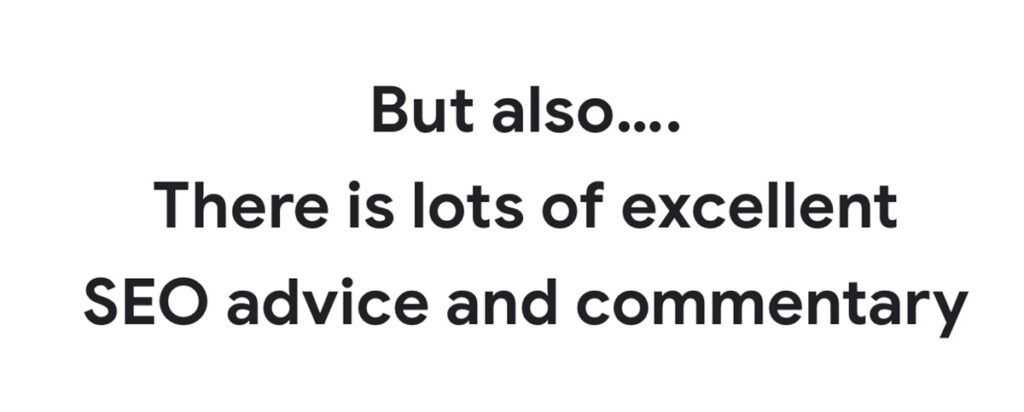
10. 구글이 창작자들에게 말하는 것과 창작자들이 구글 검색에서 성공하기 위해 듣는 것 사이의 간극을 좁혀야 합니다. 그것은 대부분 우리에게 달려 있으며, 우리는 이 문제를 해결하기 위해 노력할 것입니다. 사람 중심의 콘텐츠가 여전히 성공으로 가는 길입니다. 이를 더 잘 전달하는 방법을 찾을 수 있기를 바랍니다…
The gap between what Google says to creators and what creators hear about being successful in Google Search needs to get better. That’s largely on us; something we’ll be working on. People-first content remains path to success. Hopefully can find better ways to communicate this…

11. 예를 들어, “구글을 위해 일하지 마세요”라고 말하는 대신에 우리의 지침은 “사람들을 위해 일할 것이라면 구글을 위해 일하세요”라고 말할 수 있습니다. 여전히 많은 생각을 해야 하지만, “하지 마세요”는 “해야 합니다”로 바뀌어야 할 것 같습니다…
For example, instead of saying “Don’t do things for Google” our guidance might say “Yes, do things for Google if they are the things you’d do for people” There’s still much to think though, but the “don’t do” likely needs to change to “do do” to close the gap…
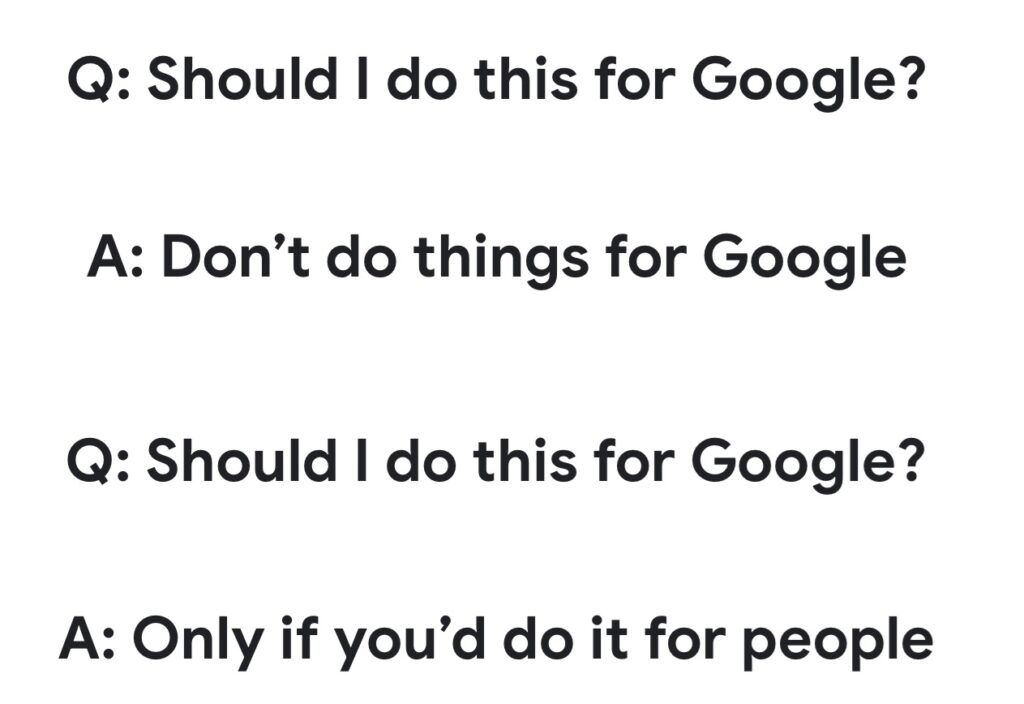
12. 아마도 우리는 우리의 시스템이 사람들이 좋아하는 것을 추구한다는 것을 더 명확히 말해야 할 것입니다. 그래서 만약 당신이 “알고리즘을 쫓는다면,” 당신은 뒤처집니다. 만약 당신이 사람들이 좋아하는 것을 쫓는다면, 당신은 알고리즘보다 앞서 있습니다.
Perhaps we need to speak more clearly that our systems are chasing what people like, so if you “chase the algorithm,” you’re behind. If you chase what people like, you’re ahead of the algorithm.
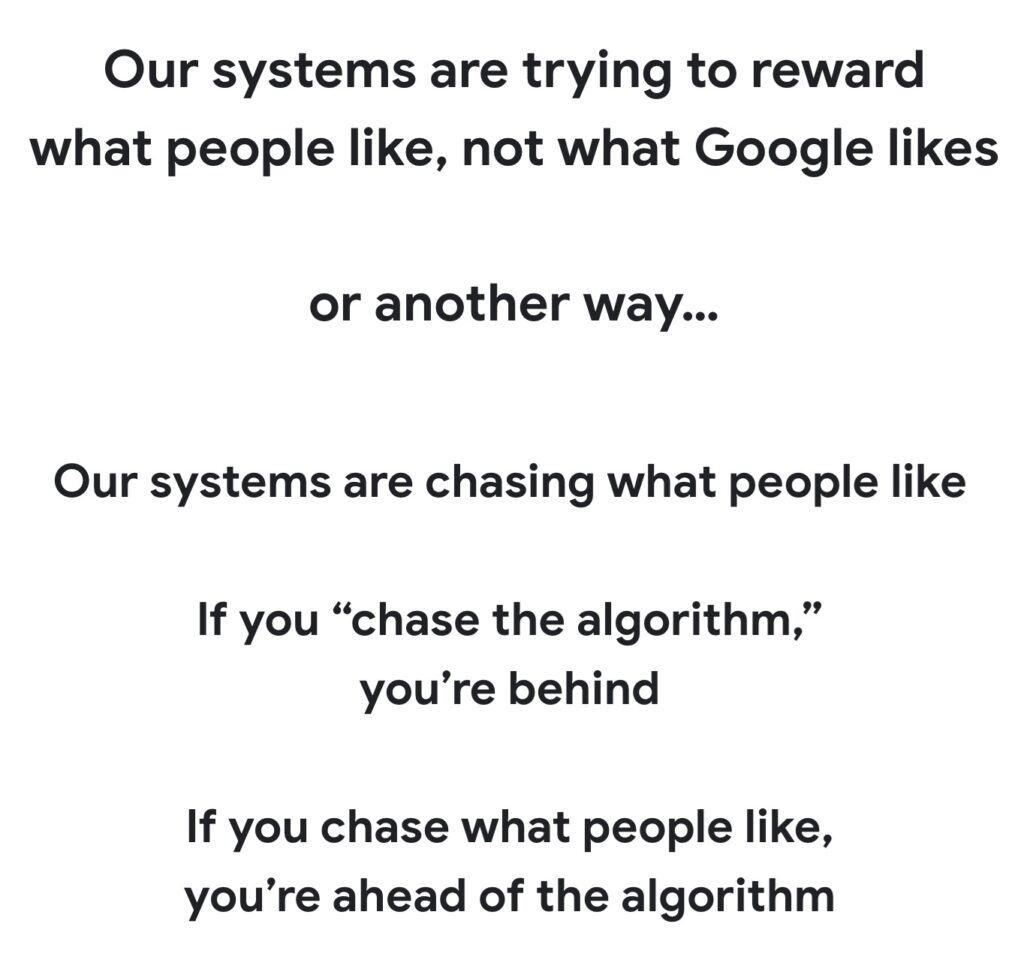
13. 우리의 창작자들과의 소통이 개선되어야 하지만, 그렇다고 해서 일부 창작자들이 만족스럽지 않은 콘텐츠를 만들고 있다는 사실을 없애지는 않습니다. 구글 검색은 계속 개선되어야 합니다. 왜냐하면 사람들은 우리와 함께 검색할 때 만족스러운 경험을 원하기 때문입니다…
While our communication with creators needs to get better, that doesn’t take away from the fact some well know if they’re creating content that’s not really satisfying. Google Search needs to keep improving because people want a satisfying experience when they search with us…
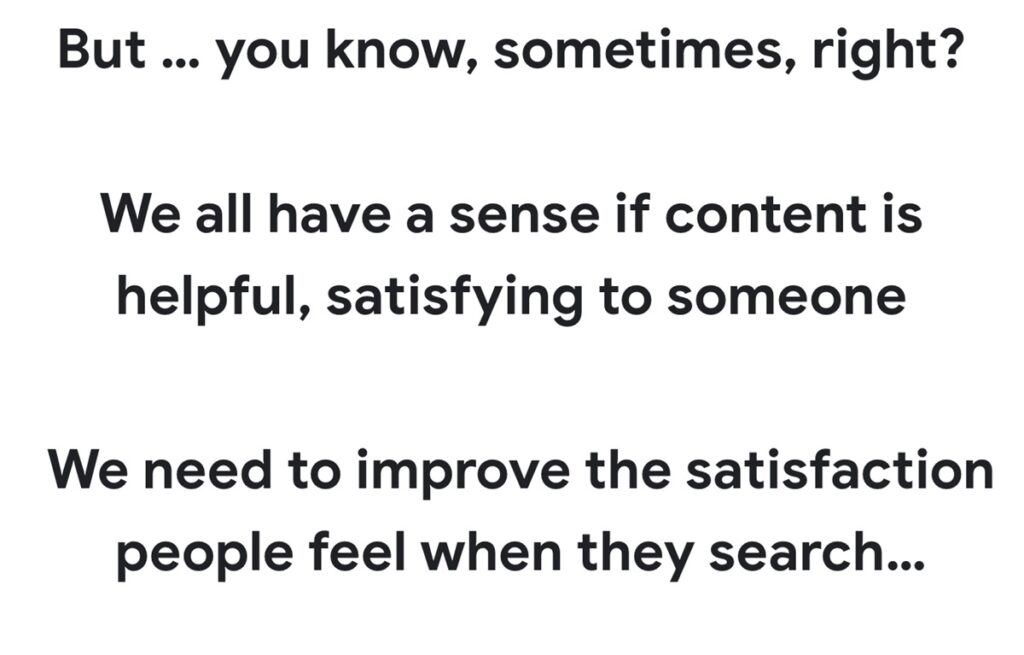
14. 구글 검색은 계속해서 개선되어야 합니다. 우리 모두가 불만족에 대한 헤드라인을 보았기 때문입니다. 제 강연에서는 2013년 매트 컷츠가 구글에서 있었을 때, 불만족과 검색을 위해 만들어진 콘텐츠에 대한 이야기를 담은 3장의 슬라이드를 소개했습니다. 이러한 내용은 반복되는 주기의 일부입니다.
Google Search needs to keep improving, because we’ve all seen the headlines of dissatisfaction. Here, in my talk, I brought up 3 slides that were from a talk Matt Cutts gave in 2013 when he was at Google, about dissatisfaction and made-for-search content. This leads to cycles…

15. 검색과 콘텐츠는 주기적인 변화를 겪습니다. 도움이 되지 않는 콘텐츠가 증가할 수 있고, 검색 시스템은 이를 해결하기 위해 진화합니다. 우리는 현재 그러한 주기 중 하나를 경험하고 있습니다. 2011년 ‘판다’ 시절과 2003년 ‘플로리다’ 시절, 그리고 그 이전인 1998년에도 비슷한 주기를 겪었습니다.
Search and content can move through cycles. You can have a rise in unhelpful content, and search systems evolve to deal with it. We’re in one of those cycles now. We went through one in 2011 (the “Panda” days), and in 2003 (the “Florida” days) and even before. Like 1998…
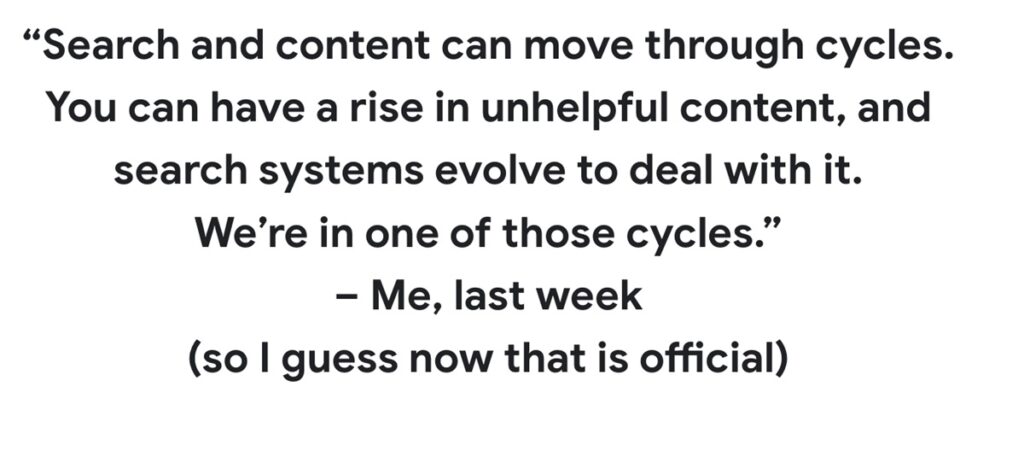
16. 1998년에, 구글에 합류하기 전에, 당시의 검색 엔진들이 사람이 아닌 검색 엔진을 위주로 설계된 콘텐츠를 어떻게 다루려고 했는지에 대해 썼습니다. 특히 클로킹과 도어웨이 페이지의 증가가 두드러졌습니다.
In 1998, long before I joined Google or Google existed, I wrote about how search engines of the day were trying to understand how to deal with content “designed primarily for search engines, not for human beings.” In particular, rise of what we now call cloaking & doorway pages…
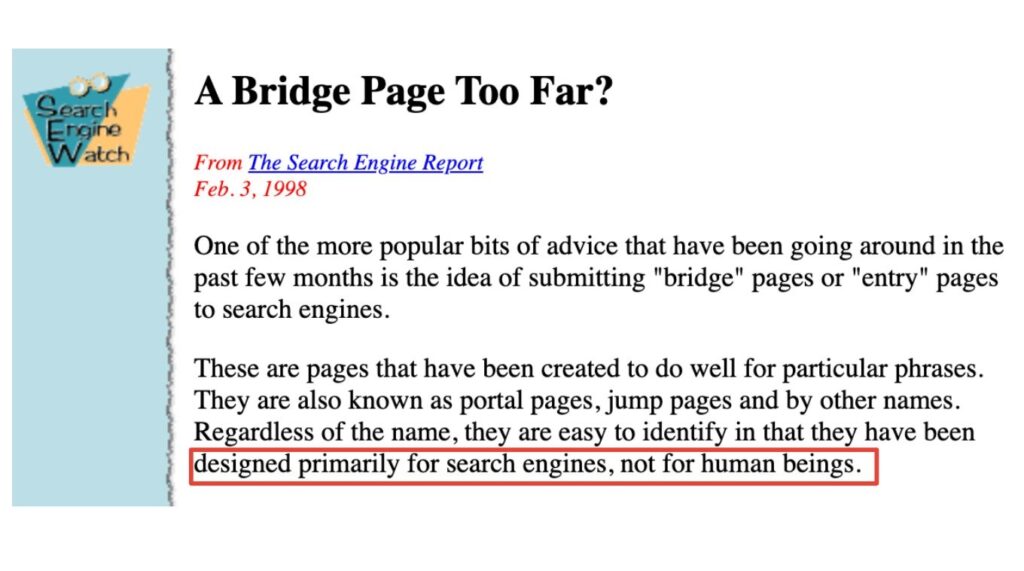
17. 당시 검색 엔진들은 이런 종류의 콘텐츠를 처음 보았습니다. 검색엔진의 관심은, 그때나 지금이나, 사용자에게 우수한 결과를 보여주는 것에 어떤 영향을 미칠지에 관한 것이었습니다. 놀랍지 않게도, 검색 엔진들은 곧 이에 대해 조치를 취했습니다. (구글은 또한 이를 스팸으로 간주합니다) https://developers.google.com/search/docs/essentials/spam-policies#cloaking)
The search engines back then had never seen this type of content before. The concern then, as it is now, was how might impact showing great results to users. Not surprisingly, the search engines soon took action against it. (Google also considers it spam: https://developers.google.com/search/docs/essentials/spam-policies#cloaking)
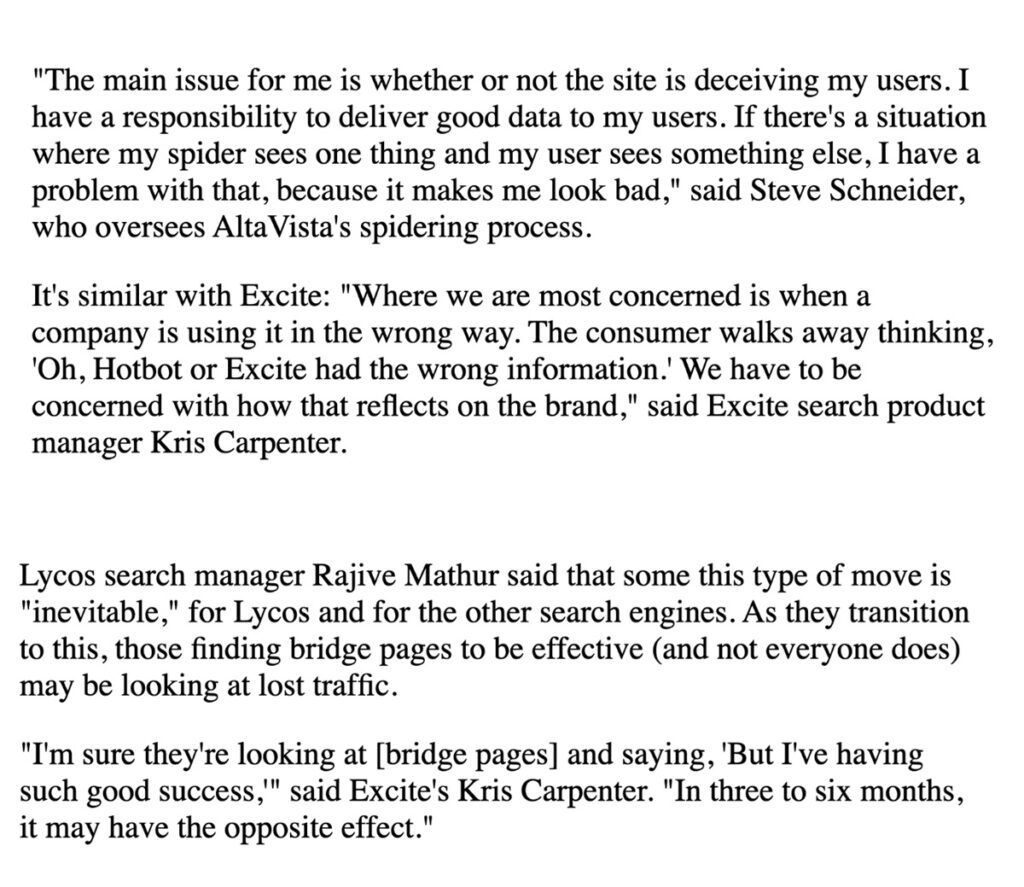
18. 저희 시스템은 항상 그래왔듯이 계속 발전하여 결과에 대한 만족도를 높일 것입니다. 저희는 새로운 시스템을 개발하고 기존 시스템을 개선하기 위해 계속 노력할 것입니다
Our systems, as always, will keep evolving to increase satisfaction with our results. We are and will continue to develop new systems and improvements to our existing ones.
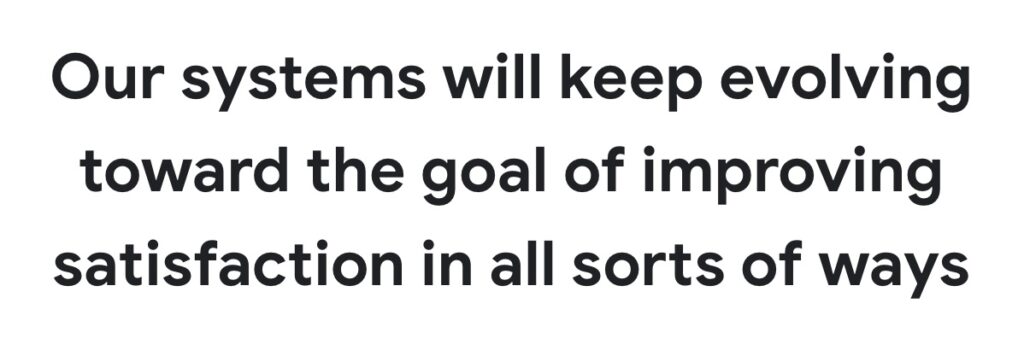
19. 업데이트를 발표한 후 일부는 검색과 관련된 문제점을 지적할 수 있습니다. 구글 검색은 완벽하지 않으며, 앞으로도 완벽할 수 없습니다. 항상 지적할 수 있는 나쁜 예시가 있을 것입니다. 피드백은 감사히 받아들이며, 이것이 우리가 무시하고 있다는 의미는 아닙니다.
It’s not uncommon after we release an update some may point to flaws/problems with search. “But what about!” As said, Google Search isn’t perfect & never will be. There will always be some bad examples to point at. Feedback is appreciated & it doesn’t mean we’re ignoring it…
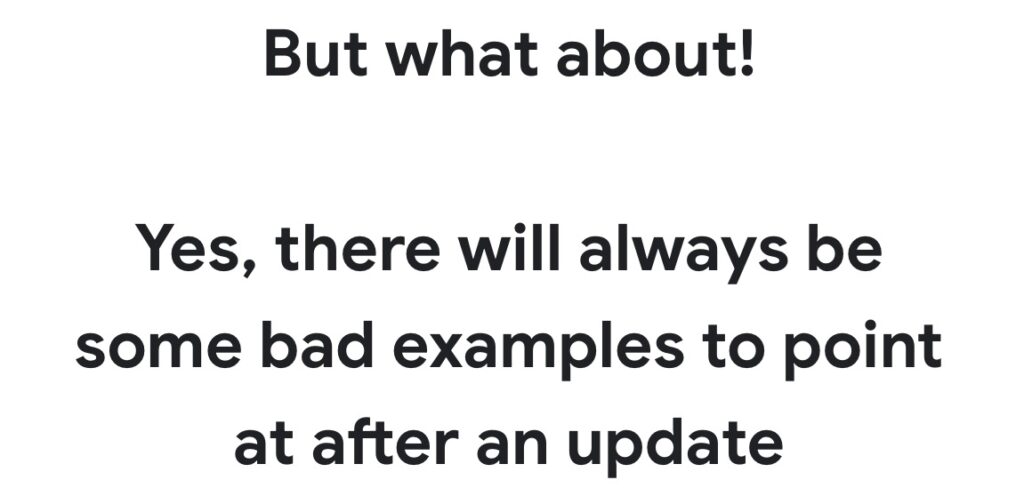
20. 나쁜 예시들이 업데이트가 전반적으로 결과를 개선하지 않았다는 것을 의미하는 것은 아닙니다. 이러한 예시들은 우리가 개선해야 할 다른 시스템들을 포함할 수도 있습니다. 저희는 나쁜 예시들을 살펴보고, 기저 문제를 이해하며, 향후 개선을 위해 노력합니다.
Bad examples don’t mean that an update didn’t generally improve results overall. They may also involve other systems we need to improve. We look at bad examples, try to understand underlying issues and move forward with figure improvements. More here: https://blog.google/products/search/how-we-update-search-improve-results/
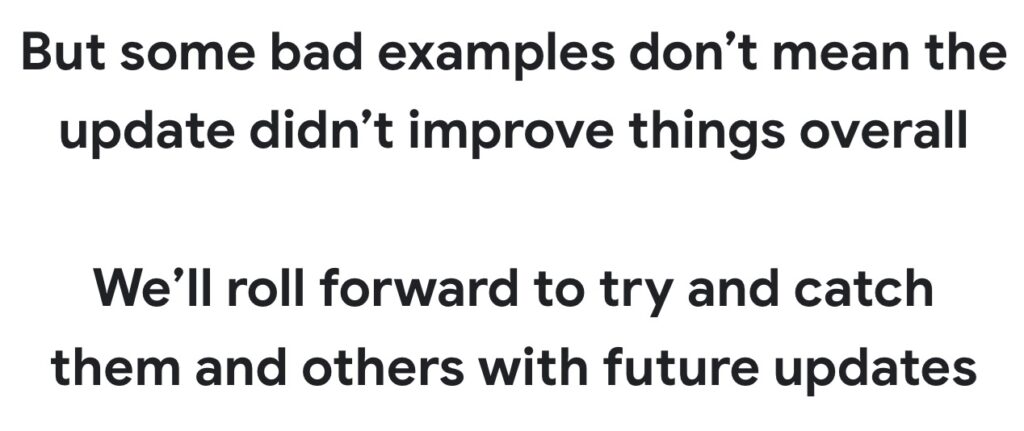
21. 제 강연에서도 언급했듯이, 우리는 사람들이 제기한 문제들을 인식하고 있으며, 이를 해결하기 위한 다양한 순위 개선 작업들이 이미 진행 중입니다. 이것이 어떤 이들이 본 “준비하세요” 게시물의 근거입니다. 사실 저는 정반대의 말을 했습니다.
I also mentioned in my talk that we have seen some of the issues people have raised and there are all types of ranking improvements already in the works to deal with these. This is the source of the “buckle up” posts some may have seen. I kind of said the opposite…
22. 우리는 많은 순위 업데이트를 계획하고 있습니다. “준비하세요”라고 말하고 싶지 않았던 이유는, 훌륭한 콘텐츠를 만드는 사람들에게 이러한 업데이트는 실제로 걱정거리가 되어서는 안 된다는 것입니다. 정말 그래서는 안 됩니다. 중요한 것은, 우리는 피드백을 소중히 여기고, 부정적인 예시들을 진지하게 받아들이며, 개선을 위해 노력한다는 것입니다.
We do have lots of ranking updates coming. I said something like “I don’t want to say ‘buckle up’ because for people making great content, these really shouldn’t be a concern.” Really shouldn’t be. Point is, we appreciate feedback, take bad examples seriously & do look to improve
23. 마무리하자면, 구글 검색은 오픈 웹과 콘텐츠 제작자들이 성공하기를 바랍니다. 이것은 우리가 보여주는 결과의 기반입니다. 훌륭한 콘텐츠를 만드는 모든 분들께 감사드리며, 창작자들과 더욱 효과적으로 소통하고 그들의 훌륭한 콘텐츠를 보상하는 방법을 모색할 것입니다.
To close, Google Search wants the open web and content creators to succeed. It’s the foundation for the result we show. We appreciate all of those who are making great content, and we’ll be looking at ways to better communicate with creators and reward that great content.

관련기사
[토막 SEO] 구글은 AI 생성 콘텐츠에 불이익을 주는가
거북이 미디어 전략 연구소장은 미디어의 온라인 수익화와 전략에 주요 관심을 가지고 있습니다.
저는 Publisher side에서 2015년부터 모바일과 PC 광고를 담당했습니다. 2022년부터 국내 포털을 담당하고 있습니다.
▲ 강의 이력
구글 디지털 성장 프로그램의 광고 워크샵 게스트 스피커(21년 6월)
구글 서치콘솔, 네이버 서치어드바이저, MS 웹마스터 도구 사용법(24년 8월 한국 언론진흥재단 미디어교육원)